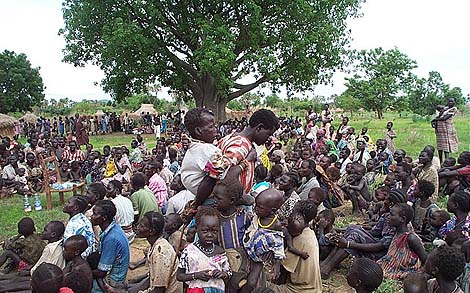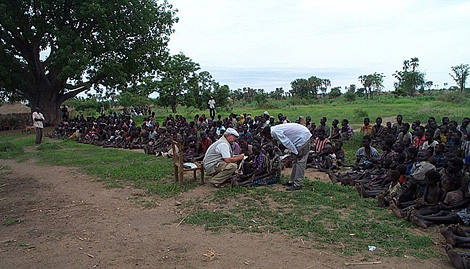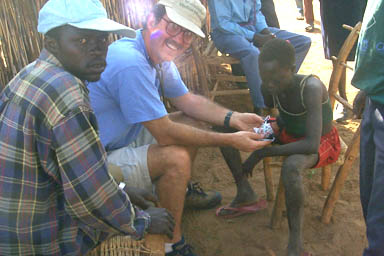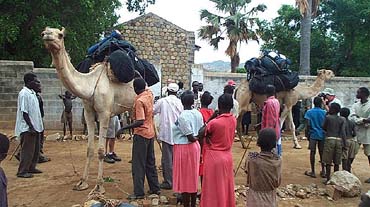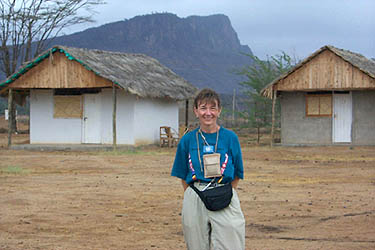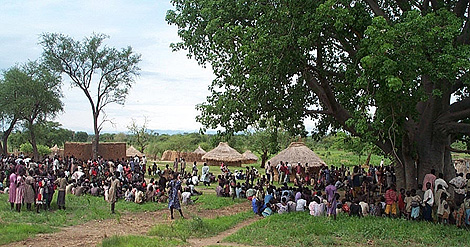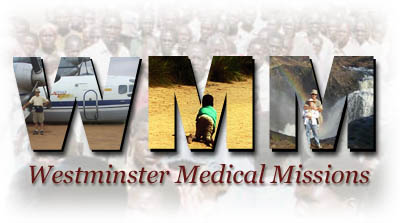
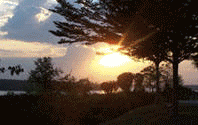
![]()
"I was sick and you looked after me."
Matthew 25:36
Sudan - 2000
Kaoda, Badura, Kumu, Yabus, and Belatuma don’t mean much to most Americans. However, to the eight members of the Westminster Medical Missions team from Mercer county, the names are vivid reminders of pain and suffering in southern Sudan. What began in August 1999 and was over in two weeks in the end of June 2000, shall not soon be forgotten.
While listening to Dr. Dick Bransford of Bethany Crippled Children’s Hospital of Kajabe, Kenya tell about the misery in southern Sudan in August 1999, several of us made a commitment to him to form a medical team to go to southern Sudan. Most of us had known that the civil war in Sudan had been going on for over 15 years and that well over one million people had been killed (some say the figure is closer to two million). We also knew that the north had been stepping up its intense bombing campaign in the south and that hospitals, churches and schools had been bombed with increasing frequency. The video that Dr. Bransford showed us was very vivid in the depiction of starvation, severe disease as well as the practice of extreme cruelty and even the thriving slaver trade.
Since Westminster Medical Missions had been doing medical missions since 1993 and had extensive experience in Africa, it was the perfect organization to get the medical team rolling. We hooked up with Safe Harbor of California who has extensive experience in southern Sudan. The team consisted of Dr. David Hopper, Steve Vail (David’s cousin from Knoxville), Tom Swanner, Nancy Shrewsbury, Dollie Crockett, RN,, Vickie Harris, RN, Kristie Blankenship, and myself.
I asked each team member to pack everything that they would need in their backpack and use their stow bags for medical supplies. Finally, on Tuesday June 13 we were in the parking lot of Westminster Presbyterian Church saying goodbye to friends and family. This is more significant that you might think. We were about to depart on a trip that was forbidden by the US and Sudan. The risks of capture, imprisonment and even death were higher than any of our previous trips. Our faith in God was the reason that we went and the reason that we even dared to attempt such a large project with such a small team.
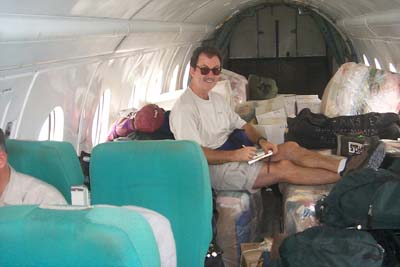 Our
flights over went well and we met Jim and Tisha Prunty at the Nairobi
airport. Jim and Tisha were missionaries sponsored by Safe Harbor and
were to be with us every step of the way.
Our
flights over went well and we met Jim and Tisha Prunty at the Nairobi
airport. Jim and Tisha were missionaries sponsored by Safe Harbor and
were to be with us every step of the way.
They got us of the airport and got us cleared by the Sudanese Peoples Liberation Army (SPLA). These are the "rebels" who have been fighting the war in southern Sudan. We caught another plane to Lokichokio in Northern Kenya. This is where most of the flights into southern Sudan depart from. We spent the night there after "popping " about 5,000 worm pills in dispensing bags.
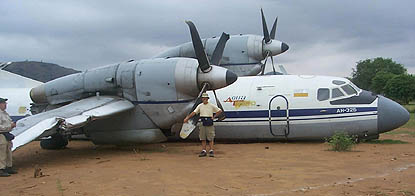 The
next morning we loaded into another small airplane and flew two hours in
the Nuba Mountains. After landing the very first thing we see is the
plane we were supposed to have flown in on, crashed on the end of a
short dirt landing strip. This and the temperature of over 100 degrees
was a stark reminder that we weren’t in Kansas anymore.
The
next morning we loaded into another small airplane and flew two hours in
the Nuba Mountains. After landing the very first thing we see is the
plane we were supposed to have flown in on, crashed on the end of a
short dirt landing strip. This and the temperature of over 100 degrees
was a stark reminder that we weren’t in Kansas anymore.
After walking for about one and a half hours we reached the village of Kaoda. Actually we were about another thirty minutes from the village, but everyone had deserted the village because of the frequent bombings. We saw numerous bomb craters and even one house totally destroyed where eight children had been killed during the bombing. We finally got the local rebel leaders to agree to let us sleep in the village only after we acknowledged that they could not protect us from the bombing raids. We put up our one man tents and finally sat down to eat our one meal per day of MRE’s (meals ready to eat as the military calls them). By this time it is totally dark and we are really tired. As we would do for the next ten nights, we gladly crawled into our tent and slept on the ground separated only by a thin sleeping mat. It didn’t really matter that we were really sweaty dirty and we were going to sleep in a tent that made it much hotter. Some of us would go the next two to three days before getting any muddy washing water.
The next day was our first clinic day. God was gracious to us because only 225 patients showed up to receive care. This gave the four of us who had never been in Africa a chance to find out how we did what we came to do. We were able to give out glasses, clothes, toys, candy and most of all medicine. With only 225 patients to see, we were through by early afternoon and ready to start planning for the next day. Knowing that the reason for the low number was because everyone had deserted the village because of fear of bombing, made us feel somewhat better. However, I felt that we could split the teams and send four of us into the mountains to set up a clinic at another village.
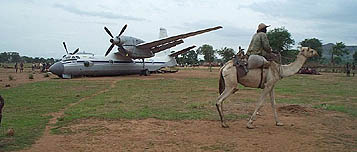 So
after waiting to get the only transportation available to carry our
heavy medical bags-camels, we started walking. Little did we know that
it would be four and one half hours before we reached Badura in the Nuba
Mountains. There had never been another medical team there (white or
black) and many of these people had never seen white people before. Just
like the night before, we put up our tents in the dark, ate our MRE’s
and went to bed without even thinking of a bath. With Nancy Shrewsbury,
Vickie Harris , Steve Vail and myself sleeping in a strange place, I
could only imagine why God had brought us all this way. I prayed that
the other team was safe and confident. I thought of what I would be
doing at home and the differences in practicing medicine between the US
and in the bush in southern Sudan. There were no beepers, cell phones or
third party insurances here. The first day had been very light and I was
sure that was only because the village had been deserted.
So
after waiting to get the only transportation available to carry our
heavy medical bags-camels, we started walking. Little did we know that
it would be four and one half hours before we reached Badura in the Nuba
Mountains. There had never been another medical team there (white or
black) and many of these people had never seen white people before. Just
like the night before, we put up our tents in the dark, ate our MRE’s
and went to bed without even thinking of a bath. With Nancy Shrewsbury,
Vickie Harris , Steve Vail and myself sleeping in a strange place, I
could only imagine why God had brought us all this way. I prayed that
the other team was safe and confident. I thought of what I would be
doing at home and the differences in practicing medicine between the US
and in the bush in southern Sudan. There were no beepers, cell phones or
third party insurances here. The first day had been very light and I was
sure that was only because the village had been deserted.
Starting the clinic early the next day we were able to see over 400 people before calling it quits in the hottest part of the day. We were so busy that we sent a runner back to the other team telling them that we would stay there a least another night, and that if they were not overwhelmed (which they were) that they could come and join us. This clinic was just as I had told the team the medical clinics would be. Large numbers of people, many had never seen a doctor before. We not only gave out medical care, medicine, clothes, toys, and some glasses, we also gave out lolly pops and bubble gum. The kids had never had candy or bubble gum before. I only wish that Jack Sarver (Sarver candy company) could have been there to experience the joy of giving out each piece of his candy to a new young patient as a way to show love and friendship. It is a great way to take a child’s mind off of a visit by a medical team who look like ghosts by learning to chew bubble gum.
There were many sad tales as always on a trip like this. To see an eight year old girl with her right arm missing because of shrapnel from a bomb dropped by an Antonov bomber, will break your heart. Even giving her a small black doll with her bubble gum didn’t seem to cheer her very much. We saw the usual cases of malaria, leprosy, and malnutrition. Most of the people only had one meal a day and it consisted of cooked sorgum (referred to a "paper food"). Many of the malnourished infants were unable to get any milk because their mother’s breast milk had dried up. We saw people from one village who did not believe in the new "western clothes" and simply wore a string with beads covering the front. We treated patients who were very dirty indicating that they had slept on the ground and not in a tuckel (hut). What water that was available was very muddy and therefore almost everyone had diarrhea. Fortunately, we had brought the right medicines for the illnesses seen.
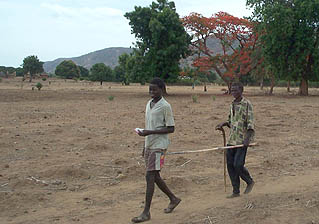 At
the end of the day we were very tired. We had gotten some water earlier
in the day and put in a plastic shower bag to leave it laying out in the
sun . For the first time in two days we were able to rinse off with the
muddy water in the bag using a poncho for cover and our flash lights for
light.
At
the end of the day we were very tired. We had gotten some water earlier
in the day and put in a plastic shower bag to leave it laying out in the
sun . For the first time in two days we were able to rinse off with the
muddy water in the bag using a poncho for cover and our flash lights for
light.
After a refreshing "shower" we were excited to have MRE’s to eat and time to talk to the local rebel leaders. They were interested in why we came to help them. We told them that we came because God had blessed us and at the same time told us to share our blessings. Even though the "Muslim" north was bombing the "Christian" south, he did not understand why this has been going on almost twenty years. Neither us had the answer to a war that had gone on too long and killed too many people, but they were very grateful that the Christians in America cared enough to send help to his people.
The next day started out at 5:30 AM with the sound of hundreds of people lining up to be seen. The other team had sent a note back saying that they could not come because the expected flood of patients had showed up. We knew that we had to get started because we had to be out of Badura and back to Kaoda before dark if possible. We saw over 300 people and managed to get packed to go by 2 PM. Following the one camel that came to get us, we were able to get back in only four hours and fifteen minutes.
Arriving back in Kaoda we immediately saw the lines waiting to be seen. Quickly unloading our camel, our team joined the other team and we were able to finish at dark. As we suspected they had been as busy as we were and had seen their share of misery. A small child with a massive tumor pushing his right eye onto his cheek was particularly depressing. He even came back the next day, but there was nowhere to send him and we could not take him with us. As far as I know that child is still there waiting for someone to help him.
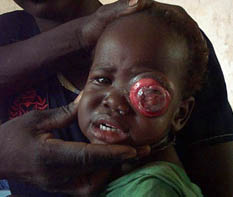 We
were supposed to be picked up early the next morning and flown to the
oilfields. Unfortunately, the fighting had flared there and we could not
go to the oilfields. That same plane was also supposed to bring in our
staged supplies, but now we had to go to plan B. Problem was that we had
not figured out what plan B was going to be. If we combined all of our
medicine, I felt that we could do one more clinic before leaving the
Nuba mountains . Little did I know that we would be working on plan Z
before this trip was over. The Antonov bombers that we had heard so much
about would show up and make their presence felt. God had taken us this
far and none of us doubted that he would take us the rest of the way. We
just wondered where that way was going to lead us.
We
were supposed to be picked up early the next morning and flown to the
oilfields. Unfortunately, the fighting had flared there and we could not
go to the oilfields. That same plane was also supposed to bring in our
staged supplies, but now we had to go to plan B. Problem was that we had
not figured out what plan B was going to be. If we combined all of our
medicine, I felt that we could do one more clinic before leaving the
Nuba mountains . Little did I know that we would be working on plan Z
before this trip was over. The Antonov bombers that we had heard so much
about would show up and make their presence felt. God had taken us this
far and none of us doubted that he would take us the rest of the way. We
just wondered where that way was going to lead us.
The next day since we could not go to our previously planned stop in the oilfields , we took the entire team to the small village of Kumu. After a two hour walk in 100 degree weather, we arrived at Kumu. The clinic was set up in a thatched roof church with dirt floors and cut branches for benches. It easily got to 110 degrees before the day was over. We saw about 350 patients and were very hot and tired by the time to leave. As always there is one patient who stands out from that day and will always be a part of the team’s memory.
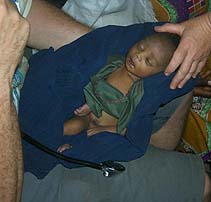 A
mother brought in her six day old infant who was in marked respiratory
distress. The infant’s heart rate was only 52 and it had very labored
respirations. The main thing that I remember about that child was that
is was so cold. Dr. Hopper was examining the infant and he and I both
realized what was going to happen. I called the entire team over and
asked them to put their hands on this infant and pray for him. I told
them that this is where God was going to be the only answer because we
had nowhere to take this child, no oxygen or other equipment that this
infant would surly require if he were to have a chance to live. We gave
the infant a shot and the mother wrapped him up and took him home.
A
mother brought in her six day old infant who was in marked respiratory
distress. The infant’s heart rate was only 52 and it had very labored
respirations. The main thing that I remember about that child was that
is was so cold. Dr. Hopper was examining the infant and he and I both
realized what was going to happen. I called the entire team over and
asked them to put their hands on this infant and pray for him. I told
them that this is where God was going to be the only answer because we
had nowhere to take this child, no oxygen or other equipment that this
infant would surly require if he were to have a chance to live. We gave
the infant a shot and the mother wrapped him up and took him home.
In developing countries this is a common occurrence, but it brought out many a tear from our team. The problem is that we are so busy and have so many to see, that we just can’t sit and ponder the sadness around us. With our bags packed on a camel, we began the walk back to Kaoda.
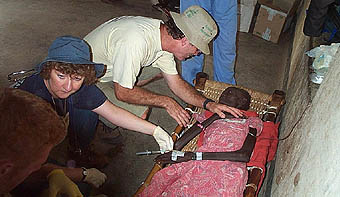 When
we arrived back at base, Jim Prunty told me that we had to leave the
next morning regardless of where we went. He went on to explain that the
Antonov bomber had flown over our location to bomb another village
further south. We were no longer "a secret" where we were, and we had to
leave in the morning early. The last night at Kaodo was very busy and
much time was spent packing all of our bags and medical supplies. While
we were working in the dark a woman dying from AIDS with pain and
diarrhea was brought to us. We started her on IV fluids, medicine for
pain, nausea and vomiting. A young man named Brian who had accompanied
the Safe Harbor evangelistic team really felt drawn to help this woman.
He stayed up most of the night taking care of her needs and praying for
her. The next morning she was strong enough to walk home with some
assistance.
When
we arrived back at base, Jim Prunty told me that we had to leave the
next morning regardless of where we went. He went on to explain that the
Antonov bomber had flown over our location to bomb another village
further south. We were no longer "a secret" where we were, and we had to
leave in the morning early. The last night at Kaodo was very busy and
much time was spent packing all of our bags and medical supplies. While
we were working in the dark a woman dying from AIDS with pain and
diarrhea was brought to us. We started her on IV fluids, medicine for
pain, nausea and vomiting. A young man named Brian who had accompanied
the Safe Harbor evangelistic team really felt drawn to help this woman.
He stayed up most of the night taking care of her needs and praying for
her. The next morning she was strong enough to walk home with some
assistance.
We did not know that Dennis Bennett (Blue Nile Project) had met with Tisha Prunty back at Loki and was to hook up with our team to go to the Blue Nile region of Sudan. He flew in on a very small Russian plane to pick us up. The most fear that many of the team members could recall was when we were trying to get that small plane off of the runway. Before we took off, we had to dump all of our water and other heavy "nonessential" stuff on the runway to lighten the plane. To make matters even worse an Antonov plane flew over while we were loading and we all had to run under the trees for cover. With much prayer and held breath we packed into that plane and made it off the dirt strip.
Two hours later we landed in the Blue Nile region. What a contrast! Whereas the Nuba mountains was almost dessert, Blue Nile was beginning their rainy season. Everything was wet, muddy and the mosquitoes were out in droves. We landed in Yabus and even with all the water that one could ask for, these people were much sicker. They had less food and much more Malaria and malnutrition was very evident.
We held a brief (325 people) clinic in Yabus so we could be allowed to go to Bellatuma, a camp for displaced people. The people at Bellatuma had been driven out of their villages and the villages burned down three months earlier. There were now over 13,000 people living in this camp. We arrive at Bellatuma after dark. After setting up our tents and eating in the dark, we walked about a half mile to the sounds of singing. There must have been 500 people sitting in a circle singing Christian songs. Christianity had been introduced to these people in the 1930's and many people there had relatives who had died so that they could have the opportunity to sing those songs. Here we were under the Milky Way listening to those songs. It was like listening to the voice of God.
The next day we started our clinic at 6 AM. Thousands of very sick people came. We were actually able to only see about 1000 of them. There was a terrible epidemic of conjunctivitis (eye infection). Fortunately King Pharmaceutical (Bristol Tennessee) have given us over 200 dose of an eye drop that could be divided into until we had 600 doses. We treated many with IV fluids (courtesy of Bluefield Regional Medical Center), glasses, and nutritional supplements. Even though we could not begin to see them all, we were able to leave many bags of supplies.
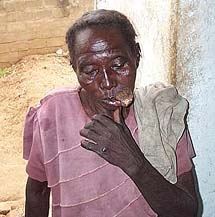 That
was our last clinic day. When we left they asked us for many things. The
first was to pray for them. The second was for us not to forget them.
The third was for us to remember what we had seen and how desperate the
need is; then they begged us to come back to help.
That
was our last clinic day. When we left they asked us for many things. The
first was to pray for them. The second was for us not to forget them.
The third was for us to remember what we had seen and how desperate the
need is; then they begged us to come back to help.
Many on my team would go back today. We talk about our experiences and share our pictures, but there is no way that anyone else can experience the desperation that many of these people feel. Staying alive each day is hard work. Seeing loved one die has become a way of life.
I ask you to pray for the people of Southern Sudan and ask God to work out a lasting peace for that war torn country. Also pray that we can continue to assist those precious people.
